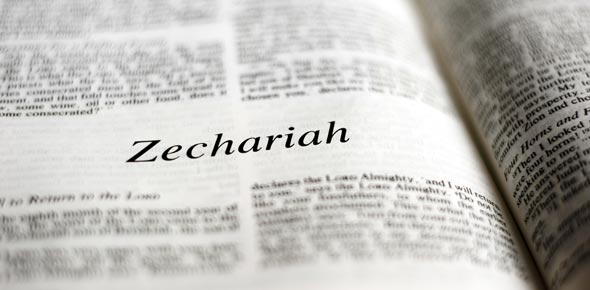Four Reasons You Should Preach Through Zechariah
June 20, 2019

June 20, 2019
Do you remember participating in the old “Sword Drill” Bible game as a kid? I do, and I also remember being duped by the obligatory joke, “Turn to . . . Hezekiah 6:2. DRAW YOUR SWORDS!” All of us flipped vainly through our Bibles looking for the book of Hezekiah, only to realize too late that we’d been had.
Well, fool me once and all—on the next round I determined not to be tricked again. So, a minute later when the leader called out “Zechariah 9:9. GO!” I just stood there with a smug, satisfied grin on my face, absolutely sure there was no such book.
These days, after nine years in the pastorate, I do finally know there’s a book called Zechariah—and also Zephaniah, and Nahum, and Habakkuk, too. But let’s be honest. The Minor Prophets aren’t exactly the go-to books for most preachers. There are reasons for that, and to be perfectly honest, they’re not my favorite books. I wouldn’t choose to preach a long series on any of them, Zechariah included. But still, having preached (quickly) through all twelve of the Minor Prophets, I think there are very good reasons not to neglect them—even in addition to the critical fact that they’re Scripture, and therefore profitable in all the ways the Word of God always is. So let me give you four reasons why you should preach at least a short series through Zechariah in particular.
I know Jonah gets the most press, but Zechariah is the longest of the twelve, and in my opinion it’s also the richest, most elegant, and most Christological, too. The early Christians apparently thought so, too, because they quoted Zechariah everywhere in the New Testament.
“Behold, your king is coming to you, humble and mounted on a donkey,” “They weighed out as my price thirty pieces of silver,” “They will look on me, him whom they have pierced,” “Strike the shepherd, and the sheep will be scattered”—all those famous phrases come from Zechariah. And that’s just a start.
Besides those, there are 67 other places in the New Testament where Zechariah is either quoted or alluded to, and Revelation is more influenced by Zechariah than by any other minor prophet. The New Testament authors saw Jesus everywhere in Zechariah, which is reason enough alone for us as preachers to give him some attention.
That’s (let’s just say) less the case with other Minor Prophets. In most of the Minor Prophets, important Old Testament themes—Kingship, Priesthood, Temple—may be traced out or mentioned or alluded to. But Zechariah actually pushes those themes forward in ways they haven’t yet been pushed.
Take 6:9–15, for example, where Jehozadak the High Priest is suddenly crowned King! It’s such a shocking moment because throughout the rest of the Old Testament, King and High Priest had been two different offices in Israel, never to be confused or united. Yet here, Zechariah prophesies that in the end, one man will be both Priest and King. Combine this with the vision in Zechariah 12–14 of the divine King being stricken in the place of his people, and you begin to see the silhouette of Jesus taking shape in remarkable clarity—arguably more clearly than anywhere else in the Old Testament.
So many Christians approach the Twelve with a sense that they’re little more than just a bowl of judgment spaghetti with a Messianic meatball thrown in here and there. But Zechariah has a wonderful structure—two major parts focusing on The Crowned Priest (1–8) and The Slaughtered King (9–14)—that function far more like a sword than a bowl of spaghetti. There’s a structure, an edge, and a point to the book, a weight and a balance, and we help our people immensely when we help them see and understand that reality.
The truth is, sometimes the point of a biblical passage isn’t really to tell us to do anything, so much as it is to leave us thunderstruck at what God has done for us. That bothers us sometimes, of course, because we naturally want to act.
But then again, the whole message of the gospel is that we can’t act for our own salvation; God does it all for us. That’s the message of Zechariah, and my prayer is that as we read him and listen to him, our hearts will again stand in awe of what God has done for us in Jesus Christ, the Crowned Priest, the Slaughtered and Resurrected King.
Joyce G. Baldwin, Haggai, Zechariah and Malachi: An Introduction and Commentary, vol. 28, Tyndale Old Testament Commentaries (Downers Grove, IL: InterVarsity Press, 1972).
Klein, George L. Zechariah. Vol. 21B. The New American Commentary. Nashville, TN: B & H Publishing Group, 2008.
Barker, Kenneth L. “Zechariah.” In The Expositor’s Bible Commentary: Daniel and the Minor Prophets, edited by Frank E. Gaebelein, Vol. 7. Grand Rapids, MI: Zondervan Publishing House, 1986.
G. Michael Butterworth, “Zechariah,” in New Bible Commentary: 21st Century Edition, ed. D. A. Carson et al., 4th ed. (Leicester, England; Downers Grove, IL: Inter-Varsity Press, 1994).
* * * * *
For more articles in this series, click here.